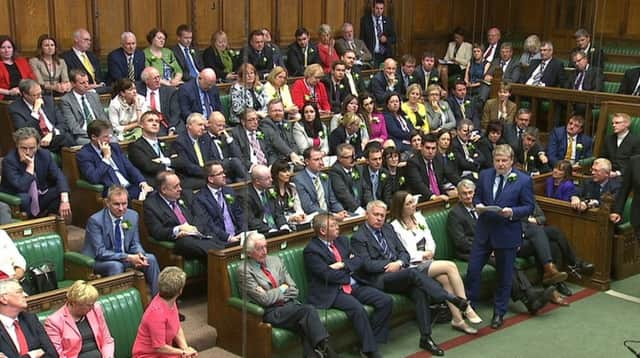Scotland Bill: Devolution settlement passes final stage


The Conservatives and Labour declared that “the Vow” made during the referendum by David Cameron, Ed Miliband and Nick Clegg was close to being fulfilled, with the bill now going to the House of Lords for further scrutiny. But the claim was dismissed by the SNP, whose MPs vented their fury over the lack of time to debate the bill yesterday, which was limited to one day.
However, the party failed to call a vote on their own amendment to deliver full fiscal autonomy despite claiming this was the will of voters in Scotland.
Advertisement
Hide AdAdvertisement
Hide AdAnd there was a surprise move by Labour to abstain and not oppose another SNP amendment to give Holyrood control over independence referendums, but it was defeated by Tory votes.
The passing of the bill means the all-party Smith Commission agreement made after the independence referendum last year is close to being put into law.
With it, the Scottish Parliament will be guaranteed permanent status unless Scottish voters want to abolish it and, controversially, MSPs will get the power to decide on abortion policy north of the Border.
The bill will also allow the Scottish Government to redesign the welfare system to match Scotland’s needs so long as it can raise the revenue for it through new tax powers. This means Tory plans to slash working tax credits can be reversed in Scotland. But in a fractious, bad-tempered debate a series of SNP amendments were defeated or not put to a vote.
Meanwhile, opposition to devolving abortion from the Labour benches, led by former cabinet minister Yvette Cooper, also failed. However, the debate was overshadowed by fury from the SNP benches that only one day had been given to discuss “over 100” amendments.
SNP frontbencher Pete Wishart condemned government handling of the bill. He said: “Scotland is watching these proceedings and it will just not understand the gross disrespect shown to our nation... it will feel like Scotland has been given an almighty slap in the face and told to just get on with it.”
Opening the debate, Scottish secretary David Mundell insisted the government had listened to arguments and concerns about the legislation before bringing forward the changes.
He said: “The government’s amendments will strengthen the Scotland Bill’s provisions and clarify its delivery of the Smith Commission agreement. With that done, it will be time for Scotland’s political parties to work together to make the new powers a success for everyone in Scotland. The amendments put beyond doubt the bill fully delivers the Smith Commission agreement.” Among the government’s proposed changes are new constitutional language and new or revised powers on taxes and welfare.
Advertisement
Hide AdAdvertisement
Hide AdLater, a group of Labour women MPs led by Ms Cooper attacked the devolution of abortion. Mr Mundell responded by saying it “verges on the patronising” to suggest Holyrood could not deal with the issue of abortion. He added that there was “no constitutional reason” to not devolve abortion, with crime and health already the responsibility of Holyrood.
SNP Westminster leader Angus Robertson insisted the bill does not implement the Smith Commission and said his party had tabled amendments to try to give Scotland the powers it was promised.
Mr Robertson said the SNP had an “overwhelming mandate” to call for further powers and would push for control over tax credits, currently earmarked for highly controversial cuts by the government.
Shadow Scottish secretary Ian Murray said the bill “delivers the vow” made during the referendum and welcomed the Conservative government accepting Labour amendments, but insisted it was “not perfect”.
He said Labour abstained over giving control of future referendums to Holyrood because “the current system of partnership is best and voting against it would have broken that partnership” and the Edinburgh Agreement set out between the parties before the 2014 Referendum.